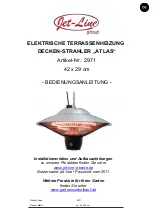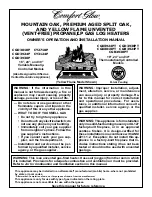
Instructions for use and maintenance
7
EN
English
Dear Clients,
The TESY team would like to congratulate you on your new
purchase. We hope that your new appliance shall bring more
comfort to your home.
This technical description and instructions manual was
prepared in order to acquaint you with the product and the
conditions of proper installation and use. These instructions
were also intended for use by qualified technicians, who shall
perform the initial installation, or disassembly and repairs in
the event of a breakdown.
The observance of the instructions contained herein is in
the interest of the buyer and represents one of the warranty
conditions, outlined in the warranty card.
Please consider that following the current instructions will
primarily be of interest to the consumer, but along with this,
it is also one of the warranty conditions, pointed out in the
warranty card, so that the consumer can benefit from the
free warranty services. The producer is not responsible for
damages in the appliance that have appeared as a result
of operation and/or installation not corresponding to the
instructions here.
The electric water heater complies with the requirements of
EN 60335-1, EN 60335-2-21.
I.
INTENDED USE
The appliance is intended to supply hot water to household
sites equipped with a piping system working at pressure
below 6 bars (0.6 MPa).
It is designed to operate only in closed and heated premises
where the temperature is not lower than 4°C and it is not
designed to operate in a continuous protracted regime.
II.
TECHNICAL PARAMETERS
1.
Nominal volume V, liters - see the appliance’s rating plate
2.
Nominal voltage - see the appliance’s rating plate
3.
Nominal power consumption - see the appliance’s rating
plate
4.
Nominal pressure - see the appliance’s rating plate
Attention! This is not the water mains pressure. This is
the pressure that is announced for the appliance and
refers to the requirements of the safety standards.
5.
Water heater type - closed type accumulating water
heater, with thermal insulation
6.
Inner coating - for models: GC-glass-ceramics; SS-stainless
steel; EV - email
7.
Daily energy consumption – see Annex I
8.
Rated load profile - see Annex I
9.
Quantity of mixed water at 40°C V40 litres - see Annex I
10.
Maximum temperature of the thermostat - see Annex I
11.
Default temperature settings - see Annex I
12.
Energy efficiency during water heating - see Annex I
For models with a regulated thermostat, the specified
temperature range refers to the cases when the
thermostat is set at maximum water heating
temperature (see below).
III.
IMPORTANT RULES
•
The water heater must only be mounted in premises with
normal fire resistance.
•
Do not switch on the water heater unless you established
it was filled with water.
•
Qualified P&P specialists and Electricians must only
perform the connecting of the water heater to the water and
electric mains. A qualified technician is a person who has
the competence according the regulations of the country in
question.
•
Upon connecting the water heater to the electric mains
care must be taken to connect the safety lead.
•
If the probability exists for the premise’s temperature to
fall below 0°C, the water heater must be drained (observe the
procedure outlined in section V, subsection 2 ‘’Water heater’s
piping connection”). In models that can be set, anti-freeze
regime can be used (it functions only when the appliance is
supplied with electrical power and when it is switched on),
adhering to the conditions in paragraph VII (temperature
setting)
•
During operation – regime of heating the water – water
drops through the drainage opening of the protection valve
are usual. The protection valve should be left open to the
atmosphere. Measures should be taken to lead and collect
the leakages in order to prevent damages, ensuring that this
is in conformation with the requirements described in p. 2 in
paragraph V.
•
The valve and the elements linked to it must be protected
from freezing.
•
During the heating the appliance could produce a hissing
noise (the boiling water). This is common and does not indicate
any damage. The noise gets higher with the time and the
reason for this is the accumulation of limestone. To remove the
noise the appliance must be cleaned from limestone. This type
of cleaning is not covered by the warranty.
•
In order to secure the water heater’s safe operation, the
safety return-valve must undergo regular cleaning and
inspections for normal functioning /the valve must not be
obstructed/, and for the regions with highly calcareous water
it must be cleaned from the accumulated lime scale. This
service is not provided under warranty maintenance.
All alterations and modifications to the water heater’s
construction and electrical circuitry are forbidden.
If
such alterations or modifications are established
during inspection, the appliance’s warranty shall
be null and void.
Alterations and modifications shall
mean each instances of removal of elements
incorporated by the manufacturer, building in of
additional components into the water heater,
replacement of elements by similar elements
unapproved by the manufacturer
Summary of Contents for GCH Series
Page 3: ...3 BG 8 8 a IV 1 e G G 2 V 1 1a a a a min 10 mm 220 300 GCHV GCH 2 2b 2 2a 2b a...
Page 13: ...13 RU 8 8 a IV 1 G G 2 3 V 1 GCHV GCH 1a min 10 mm 220 300 GCHV GCH 2 2b 2 2a 2a...
Page 116: ...116 GR Premium Line 8 IV 1 G G3 4G 2 3 V 1 1a min 10 mm 220 300 GCHV GCH 2 2b 2 2a 2b...
Page 121: ...2b 2a...
Page 122: ...2d 2f 2a 2b 2c 2e...
Page 123: ...4a 3 4b 4c...








































